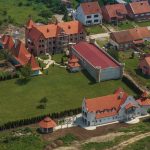As Bernard Ivezic/Poslovni Dnevnik writes on the 12th of December, 2019, the Croatian-Slovenian duo, 3t.Cable and Vahta, the very first in the European Union, have managed to come up with a viable business model for the construction of fiber optic networks in Istria, the Croatian littoral and neighbouring Slovenia. Rural Croatia is not having to simply go without, at least not this time.
Iskon Telecoms (HT Group), Terrakom and Fenice Telecom are ready to test the Rural Network Project (RUNE) out. They are the first beneficiaries of what is according to the choice of the European Commission (EC), the best European broadband project for 2019 in the category of ”innovative financing, business and investment models”.
RUNE is a project to build an optical network of up to 110,000 households in rural Croatia, in Istria and the littoral and twice as many rural households in Croatia’s neighbour to the north – Slovenia. It was jointly designed by the Croatian company 3t.Cable from Opatija and the Slovenian company Vahta from Sežana. As stated, this Croatian-Slovenian duo were the first in the entire European Union to come up with a viable business model, meaning to create a profitable business, out of building and renting an optical network in areas across rural Croatia, without using subsidies from EU funds.
So far, the main model for encouraging fiber optic expansion in rural Croatia, including mountainous areas, plains and islands, has been to subsidise such constructions by commercial operators. However, as they didn’t manage to find much financial interest in such investments, despite the subsidies, access to high-speed internet, especially via optics, was limited to densely populated areas. RUNE plans to change this in the area of Istria and the littoral in the next three years, which is how long it will take to build this new optical network.
The estimated value of the project in Croatia alone goes up to to the eye-watering 60 million euro mark. For comparison, according to Hakom, this is almost the average value of HT, A1 and Tele2’s investments together in the construction of all its networks in the first half of 2019. When this amount is added to investments in Slovenia, the estimated value of this fiber network goes up to a quarter of a billion euros, making it currently the largest greenfield telecommunications investment in all of Southeastern Europe.
Saša Ukić, the director of 3t.Cable and head of RUNE for Croatia, says that the reactions of the operators who are interested in offering services to households through their optical network are excellent, and that this will also reduce capital and some operating costs.
“We currently have three operators doing the testing – Fenice telecom, Iskon and Terrakom – everything is ready for the launch, and other operators on the market have expressed interest, and we have no doubt that they will enter their services into our network as well,” says Ukić.
Saša Ukić explains that the central part of the future RUNE network is currently active, and that this is an existing 70 kilometre optical network built by 3t.Cable in Opatija, Matulji, Lovran and Kastav.
According to Hakom, 3.63 million citizens had fast internet access in Croatia in the first half of 2019, most of them accessing it via mobile phones on 3G and 4G signals. 1.15 million Croatian households had fast access through a fixed connection, of which only 100,000 households had optics with speeds exceeding 100 Mbit/s. Most surfs were up to 30 Mbit/s.
With the advent of RUNE, private entrepreneurs are also taking the initiative in this area. Ukić is convinced that the European Commission has recognised the importance of not only their financing model for building the network, but also their management of it, as they have agreed terms with an investor who is willing to wait a little longer for a return on their investment.
RUNE will be funded by the EU Investment Fund Connecting Europe Broadband Fund (CEBF), set up by the European Commission, the European Investment Bank (EIB), Germany’s Kfw Bankengruppa, Italy’s Cassa Depositi e Prestiti (CDP) and France’s Caisse des Dépôts et consignations (CDC). The fund initially raised 420 million euros and is managed by Cube Infrastructure Managers.
“Interviews with Cube Infrastructure Managers lasted for longer than a year, and now that we’ve signed a project financing contract, we have started to build RUNE,” stated Ukić, emphasising that they have been greatly assisted by local government units.
Make sure to follow our dedicated lifestyle and business pages for much more on projects being undertaken with rural Croatia in mind.








